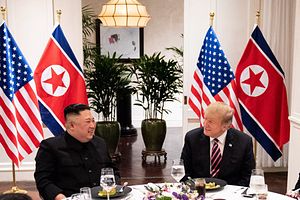The much anticipated second meeting between U.S. President Donald Trump and North Korean leader Kim Jong Un in Hanoi, Vietnam ended abruptly on Thursday. Not only did Trump and Kim fail to sign any joint agreement, following up on the joint statement issued after their Singapore meeting, but they even cut their talks short, canceling a planned lunch. Trump ended up leaving Hanoi ahead of schedule (Kim is remaining on a visit to Vietnam until Saturday).
The summit breakdown was a blow to U.S.-North Korea diplomatic efforts, and to the many countries with a stake in that process – including China. Beijing, as Pyongyang’s main backer and only military ally, has a vested interest in seeing its neighbor escape from global pariah status and become a more ‘normal’ country.
Even more, China has every interest in making sure war never breaks out again on the Korean Peninsula, right on its doorstep. In the Korean War of 1950-53, China felt threatened enough by the advance of U.S.-led international forces that it sent troops to aid the North Korean government. By the time the armistice was signed, China had lost somewhere between 149,000 (a Chinese estimate) and 400,000 (based on Western estimates) soldiers.
Beijing has thus been encouraging the diplomatic process between the United States and North Korea – and as an added incentive, the whirlwind of diplomacy in 2018 provided the impetus for repairing a rocky China-North Korea relationship. Kim Jong Un made his first official visit to China in March 2018, a month ahead of the first inter-Korea summit between Kim and South Korean President Moon Jae-in. He has now visited China a total of four times – not counting the journey he made this week by train from North Korea to Vietnam, the vast majority across Chinese territory.
For decades China has consistently called for the United States and North Korea (formally known as the Democratic People’s Republic of Korea, or DPRK) to hammer out their issues through dialogue. Hopes have been raised – arguably higher than ever before – by the recent thaw on the Korean Peninsula. When those hopes came crashing back to earth with a disappointing summit, how did China respond?
For now, Beijing is remaining upbeat, despite the disappointment in Hanoi. After several questions on the Trump-Kim summit, Chinese Foreign Ministry spokesperson Lu Kang took reporters to task for an overly negative interpretation of the outcome:
Just now several of you said the DPRK-US talks have “failed,” either observing no agreement was reached or characterizing that as a setback. We’re following how the situation will evolve but I still hope that you can listen to what the U.S. and the DPRK governments will say about how they view this meeting later on.
Lu may have had some insight into what would follow at the U.S. government press conference in Hanoi. Trump categorized the summit as “a very productive time,” adding that his relationship with Kim “is very strong.”
According to Trump, even the early end to the summit “was very good, very friendly. This wasn’t a walk away, like you get up and walk out. No, this was very friendly. We shook hands.”
Trump’s assessment was echoed by U.S. Secretary of State Mike Pompeo in the same press conference. “We made real progress. And indeed we made even more progress when the two leaders met over the last 24, 36 hours,” Pompeo said. “Unfortunately, we didn’t get all the way.”
He added, however, that dialogue was expected to continue. “[T]he departure was with an agreement that we would continue to work on what has been an incredibly difficult problem. Both sides are resolved to achieve it, and everyone walked away in that spirit.”
That will be good news for Beijing, as Lu told reporters that the progress over the past year “is hard-won and should be cherished.”
“I also hope that you can realize that the Korean Peninsula nuclear issue has been there for many years and cannot be resolved overnight without effort,” Lu added, again downplaying the significance of a deadlock at this particular meeting.
“We hope that the DPRK and the US will continue the dialogue, show sincerity, respect and accommodate each other’s legitimate concerns, jointly promote denuclearization and the formation of a peaceful mechanism on the Korean Peninsula,” he said.
Lu suggested that “the two sides may continue with their talks at the working level, and we hope the[y] will maintain such dialogue.” Indeed, Pompeo said he is “hopeful that the teams will get back together in the days and weeks ahead, and continue to work out what’s a very complex problem.”
Trump went even further in his optimism, saying he still believes “we’ll end up being very good friends with Chairman Kim and with North Korea.”
On China’s role in the days ahead, Lu said that Beijing would continue what it has been doing: “In fact, since the very beginning of the Korean Peninsula nuclear issue, even in the most trying time, China has been making its utmost effort to encourage the DPRK and the U.S. to resolve the issue via the only viable way of dialogue and negotiation and uphold the peace and stability on the Peninsula.”
Oddly enough, what happened at the Hanoi summit may in fact be the best-case scenario for China. A true, lasting resolution of the North Korean nuclear issue would lessen both Pyongyang’s reliance on Beijing and China’s strategic importance for the United States. But a war would be even more devastating. From China’s perspective, the ideal outcome might be what we have now, with both sides committed to talking, but little indication that a fundamental solution is in the offing. A situation where war is off the table, but the United States and North Korea remain divided, would fit Beijing’s interests perfectly.

































